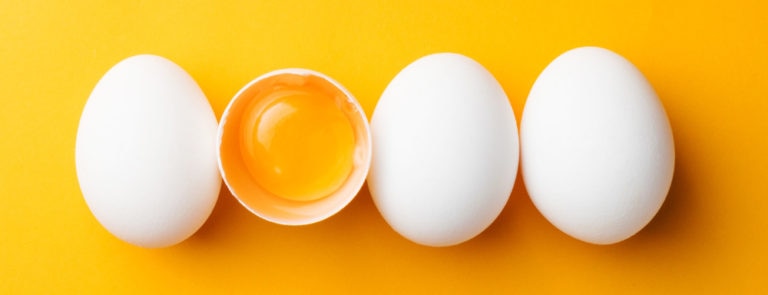15% off €35 or 20% off €45
Code:SUMMER
Lecithin: benefits, dosage & side-effects

This fatty substance can be found in the cells of body and plant tissue. What you need to know about lecithin including benefits and side-effects is here.
Find out all about lecithin, including what it does, how much you might need, where to find it and who might need to supplement their diet
Written by Cheryl Freedman on December 11, 2018 Reviewed by Fiona Hunter on January 3, 2019
What is lecithin and what does it do?
Lecithin is a fatty substance found in in the cells of your body, plant and animal tissues. It’s made up of fatty acids, and in particular one type of fat molecule called phospholipids – an essential element of cell membranes.1 Lecithin – which is named after the Greek word for egg yolk, lekithos – was first isolated from egg yolk in the 1850s.2 Nowadays, it’s used commercially as an emulsifier in packaged foods and occurs naturally in certain foods, including:3
- wholegrains
- nuts
- soybeans
- egg yolks
Lecithin is used to:4,5
- lower cholesterol
- support breast-feeding
- reduce feelings of tiredness
What does lecithin do in the body?
Once in the body, lecithin breaks down into choline,6 a vitamin-like nutrient that is important for a healthy liver. Choline also helps break down fat into energy that our bodies can use.7
Lecithin is also found in breast milk. Some women use it to reduce the viscosity of breast milk, which helps prevent blocked milk ducts that make it difficult to breast-feed easily. However, there are no studies proving it can work for this purpose.8
It also has the following additional health benefits:
- It can ease tiredness – lecithin can reduce feelings of tiredness and weakness, according to the EU’s Committee on Herbal Medicinal Products.9 Meanwhile, a 2018 study in Nutritional Journal reported that a high daily dose (1200mg) of lecithin increased energy and reduced tiredness in women going through the menopause.10
- It can reduce cholesterol – scientists think lecithin may raise levels of HDL (good) cholesterol and lower LDL (bad) cholesterol. In a 2009 study, those taking 500mg daily had 56% lower LDL cholesterol after two months.11 If you’re interested in taking lecithin, talk to your GP or a medical practitioner beforehand.
How much lecithin is safe to take?
There’s no reference nutrient intake (RNI) for lecithin so read the label of any supplements carefully. For breast-feeding, the Canadian Breast-feeding Foundation recommends 1200mg of lecithin four times a day.12

The following groups should not take soy lecithin:
- children under 12 years old13
- people who are allergic to soya, soya beans, peanuts or legumes (beans, lentils, peas), eggs and birch pollen – there is a risk of an allergic reaction14
What are the side-effects of taking lecithin?
Soya bean lecithin supplements are natural substances and generally regarded as safe to take. However, they can cause side-effects including:15
- swelling
- itching
- rashes
- stomach ache
- diarrhoea
Advice is for information only and should not replace medical care. Please check with your GP before trying any remedies.
- Science Direct. Lecithin Available from https://www.sciencedirect.com/topics/pharmacology-toxicology-and-pharmaceutical-science/lecithin
- Encyclopedia.com. Lecithin Available from https://www.encyclopedia.com/sports-and-everyday-life/food-and-drink/food-and-cooking/lecithin
- Science Direct. Lecithin Available from https://www.sciencedirect.com/topics/pharmacology-toxicology-and-pharmaceutical-science/lecithin
- Kathryn Watson. Healthline. Lecithin Benefits Available from https://www.healthline.com/health/lecithin-benefits
- Drugs and Lactation Database. Lecithin Available from https://www.ncbi.nlm.nih.gov/books/NBK501772/
- Science Direct. Lecithin Available from https://www.sciencedirect.com/topics/pharmacology-toxicology-and-pharmaceutical-science/lecithin
- European Commission. EU Register of nutrition and health claims made on food Available from http://ec.europa.eu/food/safety/labelling_nutrition/claims/register/public/?event=register.home
- Drugs and Lactation Database. Lecithin Available from https://www.ncbi.nlm.nih.gov/books/NBK501772/
- European Medicines Agency. Soya-bean lecithin Available from https://www.ema.europa.eu/documents/herbal-summary/soya-bean-lecithin-summary-public_en.pdf
- Hirose A, et al. Effect of soy lecithin on fatigue and menopausal symptoms in middle-aged women: a randomized, double-blind, placebo-controlled study Available from https://www.ncbi.nlm.nih.gov/pmc/articles/PMC5757297/
- Mourad AM, et al. Influence of Soy Lecithin Administration on Hypercholesterolemia Available from https://www.hindawi.com/journals/cholesterol/2010/824813/
- Canadian Breastfeeding Foundation. Treatments for problems: Lecithin Available from http://www.canadianbreastfeedingfoundation.org/basics/lecithin.shtml
- European Medicines Agency. Soya-bean lecithin Available from https://www.ema.europa.eu/documents/herbal-summary/soya-bean-lecithin-summary-public_en.pdf
- European Medicines Agency. Soya-bean lecithin Available from https://www.ema.europa.eu/documents/herbal-summary/soya-bean-lecithin-summary-public_en.pdf
- European Medicines Agency. Soya-bean lecithin Available from https://www.ema.europa.eu/documents/herbal-summary/soya-bean-lecithin-summary-public_en.pdf



